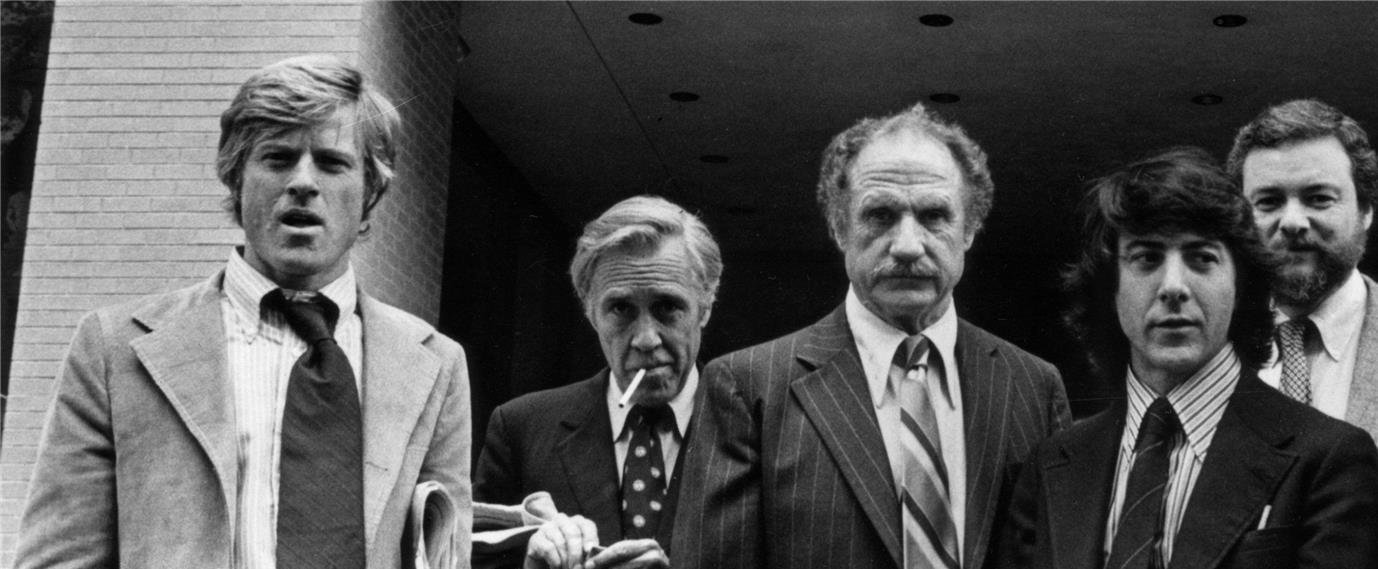غالبا ما ترتبط الصحافة الاستقصائية بمستوى الديمقراطية التي تتيحها الدول. ومن شأن ذلك النوع من الصحافة أن يفسح المجال أمام الصحفيين الاستقصائيين للاقتراب أكثر من عمل الساسة، وإعلام المواطنين بالمعلومات التي توصَّلوا إليها.
وتظهر أهمية وجود العمل الصحفي في وسط ديمقراطي جلية في الفيلم الأميركي الذي أنتج عام 1976 بعنوان "كل رجال الرئيس" (All the President’s Men).
يحكي الفيلم عن صحفيّين أميركيين هما كارل برنستين وبوب وودوارد، كانا يعملان في صحيفة "واشنطن بوست" الأميركية المرموقة في مستهل السبعينيات من القرن العشرين، وساهما في الكشف عن أكبر فضيحة فساد سياسي في تاريخ الولايات المتحدة والمعروفة بفضيحة "ووترغيت". تمكَّن الصحفيَّان بالدلائل والبراهين من إثبات تورط الرئيس الأميركي السابع والثلاثين ريتشارد نيكسون عام 1972 في محاولة التنصت على المكتب الرئيسي للحزب الديمقراطي المنافس لحزبه (الحزب الجمهوري) حول حملة الانتخابات الخاصة بتجديد منصبه لفترة رئاسية ثانية.
جسد الممثل داستن هوفمان دور الصحفي كارل برنستين، في حين كانت شخصية الصحفي بوب وودوارد من نصيب الممثل والمخرج روبرت ريدفورد. وقد برعا كلاهما في أداء دور الصحفيين، خصوصا إذا علمنا أن لفورد توجّهات نقدية مناهضة للسياسة الأميركية، ظهرت بوضوح في كثير من أعماله، كفيلمه "أسود للحملان" عام 2007، الذي يوجه فيه نقدا للحكومة الأميركية التي كانت قد بدأت ما أسمتها "الحرب على الإرهاب"، وفيلم "أيام الكوندور الثلاثة" عام 1975، وغيرهما.
في مقاله المنشور في العدد 22 من مجلة "المنطق والكلمة" الصادر في يونيو/حزيران 2001، يقول سيلفيو ويسبورد الأستاذ المساعد في قسم الصحافة والإعلام بجامعة روتجرز في نيوجرسي مؤكدا على دور الديمقراطية في تثبيت دعائم العمل الصحفي: "لعب المراسلون دورا دقيقا في عقد السبعينيات بالكشف عن الفضيحة السياسية الأكبر في الولايات المتحدة بعد الفترة التي تلت الحرب العالمية الثانية. تعقَّب صحفيو واشنطن بوست أثر سرقة صغيرة في مبنى مكاتب ووترغيت، حتى وصلوا إلى البيت الأبيض. أدى هذا التقرير إلى إجراء تحقيقات في مجلس الشيوخ، وبالنهاية إلى استقالة الرئيس ريتشارد نيكسون. كانت الصحافة في حالة ووترغيت هي المرآة التي تعكس أفضل ما يمكن لها (الصحافة) تقديمه للديمقراطية، وهو محاسبة السلطة.. هذه المَهمَّة تحوَّلت إلى اتجاه في تحرير صحف الولايات المتحدة. وفي السنوات اللاحقة، تمتَّعت مهنة الصحافة بمستوى عالٍ من الصِّدقيَّة، وارتفع بشكل ملحوظ عدد الطلاب في كليات الصحافة".
ويُظهر الفيلم التحديات الكبيرة التي واجهت صحفيي "واشنطن بوست" في ظل ظروف غامضة للقضية، ومعلومات شحيحة تم التكتم عليها من قبل المسؤولين المتورطين، ومنهم شخصيات مقربة من مصادر القرار السياسي.
والفيلم مبني على وقائع القصة الحقيقية التي صاغها الصحفيّان برنستين ووودوارد في كتابين منفصلين هما "كل رجال الرئيس" عام 1974، و"الأيام الأخيرة" عام 1976. أما السيناريو فقد كتبه الروائي والسيناريست وليام غولدمان الذي فاز بجائزتي أوسكار عن أعماله، ومنها أوسكار أفضل سيناريو عن هذا الفيلم. وقد كان روبرت ريدفورد -بطل الفيلم- على اتصال بالصحفيَّين حينما كتبا تجربتيهما تلك، وحثهما على الاهتمام بسرد طرق التحقيق الصحفية التي اتبعاها للحصول على المعلومات، أكثر من الاهتمام بسرد تفاصيل قصة الفضيحة. وبالفعل جاء الفيلم متوافقا مع تلك الرؤية التي صبَّها غولدمان على الورق، حيث سرعان ما نجد أنفسنا نعيش مع أبطال الفيلم في مكاتب صحيفة "واشنطن بوست".
ولتكون المشاهد أكثر مصداقيّة، حرص مخرج الفيلم "ألان جي بكولا" أن تُصوَّر المشاهد في مكاتب الصحيفة الأصلية، وكان له ذلك. كما انتقلت مشاهد الفيلم بين أستديوهات كاليفورنيا وشوارع وأماكن في العاصمة الأميركية واشنطن؛ لها علاقة بالقصة الأصلية.
التصوير وسط أكوام الأوراق والآلات الكاتبة والصحفيين والموظفين والمديرين، جعلنا نتلمس بأنفسنا السرعة في الأداء حينا، وحينا آخر تباطؤا ومرورا كئيبا للوقت، إضافة إلى الفوضى التي تحتاج ترتيبا وتنسيقا، والتضارب بين إدارات تقليدية وأخرى متمردة تعتمد على المجازفة وعدم التهيب من النتائج غير المحسوبة، لنرى كيف تمكّن صحفيّان من استخدام أساليب غير تقليديّة للحصول على المعلومة رغم أنهما يعملان في بيئة عمل تقليدية.
حرص كاتب السيناريو على أن تتركز حبكة الفيلم حول ما بذله الصحفيان من جهود كبيرة، وعلى إبداء الأسلوب الذي اتّبعاه في عملهما الاستقصائي، وهو أسلوب يركز على الاهتمام بالتفاصيل مهما كانت صغيرة، ولملمة خيوط قضية يؤمنان بأهميتها. كما يبدو في الفيلم تتبّع الصحفي الاستقصائي لحدسه الشخصي كسمة بارزة من سمات الصحافة الاسقصائية، فضلا عن المطاولة ومقاومة اليأس، والبراعة في تنسيق وربط النتائج.
ونرى خلال أحداث الفيلم بعض قواعد الصحافة الاستقصائية، كالعمل بروح الفريق، وإطلاع المحرر المسؤول على التفاصيل أولا بأول والاستنارة برأيه.
بدا المحرر المسؤول في الفيلم قاسيا وصارما، لما للتورط في قضايا كهذه من أثر خطير على سمعة الصحيفة، لكنه كان ظهيرا للصحفيَّين حينما رأى إشارات تبين صدق ما يفترضانه.. هذا الدعم ساهم بشكل كبير في مضي الصحفيين قدما في تحقيقهما. كما يؤصل الفيلم لسياسة عدم نشر المعلومات أبدا إلا بعد التأكد تماما من صدقيتها، وامتلاك الدلائل والبراهين التي تثبت صحَّة الافتراضات.
ويعدُّ الفيلم مرجعا مهما للصحفي الاستقصائي فيما يتعلق بحماية مصدره، فمثلا لم يذكر الفيلم ولا الكتابان اللذان صدرا وتحدثا عن هذه الفضيحة؛ من هو المسؤول الحكومي الذي كان يمدّ الصحيفة بالمعلومات والخيوط والمفاتيح للسير على هديها، ولم يُعرف هذا المصدر -الذي تبين أنه كان نائبا لمدير في مكتب التحقيقات الاتحادي (أف.بي.آي)- إلا بعد سنوات طويلة، كان فيها خارج دائرة الخطر.
بيَّن الفيلم أن الصحافة الاستقصائية ليست مجرد تسريبات تصل إلى يد الصحفي فيبدأ نشرَها، بل هي علم قائم بذاته، أو كما يقول مدير شبكة الصحافة الاستقصائية العالمية ديفد كابلن "نهج منظّم لحدس يتطلّب الغوص في العمق، والبحث الفعلي الذي يقوم به الصحفي بنفسه، إضافة إلى التغطية الصحفية، بحيث يتبع الصحفي أسلوبا علميا في البحث معتمدا على وضع فرضية واختبار مدى صحتها، والتأكّد من الحقائق المحيطة بالفرضية، ونبش الأسرار المغمورة، ووضع ركائز العدالة الاجتماعية والمساءلة، ثم الاستخدام المفرط للتسجيلات المعلنة التي تكون في العادة على شكل بيانات". وذلك ما قام به تماما صحفيّا "واشنطن بوست" أثناء كشفهما عن فضيحة "ووترغيت".
كما تمكَّنا من تجاوز المخاوف وتجاهل التهديدات التي كانت تصلهما من المتورطين في الفضيحة، وهو أمر يتعرّض له الكثير من الصحفيين الاستقصائيين الذين يسبرون أغوار قضايا مسكوت عنها.
أما نجاح الصحيفة في إثبات ما افترضه صحفياها فهو ليس انتصارا لها فحسب، بل انتصارا للصحافة كسلطة رابعة، وتأسيسا للصحافة الاستقصائية وأصولها، ونهوضا بها.








































